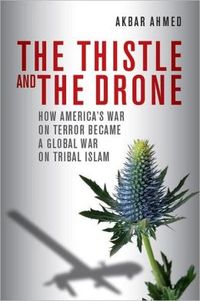

Purchase
The Thistle And The Drone
Akbar Ahmed
How America's War on Terror Became a Global War on Tribal Islam
Brookings Institution
March 2013
On Sale: March 5, 2013
424 pages
ISBN: 0815723784
EAN: 9780815723783
Kindle: B00B7PB2A4
Hardcover / e-Book
Add to Wish List
Non-Fiction
In the wake of the 9/11 attacks, the United States declared
war on terrorism. More than ten years later, the results are
decidedly mixed. Here world-renowned author, diplomat, and
scholar Akbar Ahmed reveals an important yet largely ignored
result of this war: in many nations it has exacerbated the
already broken relationship between central governments and
the largely rural Muslim tribal societies on the peripheries
of both Muslim and non-Muslim nations. The center and the
periphery are engaged in a mutually destructive civil war
across the globe, a conflict that has been intensified by
the war on terror. Conflicts between governments and
tribal societies predate the war on terror in many regions,
from South Asia to the Middle East to North Africa, pitting
those in the centers of power against those who live in the
outlying provinces. Akbar Ahmed's unique study demonstrates
that this conflict between the center and the periphery has
entered a new and dangerous stage with U.S. involvement
after 9/11 and the deployment of drones, in the hunt for al
Qaeda, threatening the very existence of many tribal
societies. American firepower and its vast anti-terror
network have turned the war on terror into a global war on
tribal Islam. And too often the victims are innocent
children at school, women in their homes, workers simply
trying to earn a living, and worshipers in their mosques.
Battered by military attacks or drone strikes one day and
suicide bombers the next, the tribes bemoan, "Every day is
like 9/11 for us." In The Thistle and the
Drone, the third volume in Ahmed's groundbreaking
trilogy examining relations between America and the Muslim
world, the author draws on forty case studies representing
the global span of Islam to demonstrate how the U.S. has
become involved directly or indirectly in each of these
societies. The study provides the social and historical
context necessary to understand how both central governments
and tribal societies have become embroiled in America's war.
Beginning with Waziristan and expanding to societies in
Central Asia, the Middle East, North Africa, and elsewhere,
Ahmed offers a fresh approach to the conflicts studied and
presents an unprecedented paradigm for understanding and
winning the war on terror.
Comments
No comments posted.
Registered users may leave comments.
Log in or register now!
| 


 © 2003-2025 off-the-edge.net
all rights reserved Privacy Policy
© 2003-2025 off-the-edge.net
all rights reserved Privacy Policy